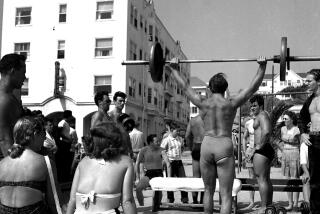Doing It Clean : Sports: While others take steroids, Jeff Moore is on a crusade to be a champion power lifter by muscle alone.
Even though it may never get him an Olympic gold medal, a high salary or his face on a cereal box, Jeff Moore is determined to become a champion weightlifter. And he’s going to do it without “the juice.”
“The juice” is what weightlifters call steroids, the dangerous muscle-enhancing drugs that many athletes believe are necessary to compete at championship levels in many sports, especially weightlifting. Moore, an intense 28-year-old who has spent the past 13 years training as a “power lifter,” is on a crusade--often a lonely crusade--to show that he can win without drugs.
“I’m going to be the champ, and I’m going to do it clean,” says Moore, who owns the “Fitness Formula” weight-training facility on North Gaffey Street in San Pedro. “I guess that, yeah, I’m trying to prove something. I’m trying to prove that I can achieve drug-level lifting without drugs. It may take me longer than it takes the druggies. But I’m going to do it.”
Moore wants to win a championship through hard work, although why he wants to might seem like a mystery to most people. There is no prize money in U.S. competitive power lifting, little opportunity for product endorsements, no front-page exposure in mainstream sports magazines. Power lifting isn’t even an Olympic sport.
“You just gotta love to lift,” says Moore. “When I lift, I’m alive.”
Power lifting is, for Moore, a full-time preoccupation. Although he works out only about two hours a day, his life is built around the sport. It’s sometimes an ascetic existence.
“It’s a 24-hour-a-day deal,” says Moore, who is single. “You can’t pull into a Jack-in-the-Box and have a hamburger, you’ve gotta stay away from liquor, cigarettes, all the drug stuff. It’s a clean life.”
Moore eats four meals a day, none of which include dessert. His idea of splurging is a bowl of popcorn.
The sport in which Moore is trying to excel--power lifting--is an obscure one to many Americans. Unlike the better-known Olympic-style weightlifting, which involves raising large amounts of weight above one’s head, power lifting involves three different lifting methods--bench presses, dead lifts and the inelegantly named “squats.”
In bench presses, the lifter lies on his back and pushes the weights up from his chest; in dead lifts, he simply picks up the weights from the floor up to thigh level; and in squats, he rests the weight bar on his shoulders behind his neck, bends down at the knees and then stands upright.
A competitive power lift is a few seconds of eye-popping, red-faced, teeth-clenching exertion, a sport of sheer muscle power. A power lifter in the middle of a lift looks like a man about to explode--or a woman about to explode, since there are a number of female competitors.
The weights involved are astounding. At the highest competitive levels--competitors are separated into body-weight classes--a power lifter will do squats with 1,000 pounds of weight on his shoulders. That’s half a ton, more than half the weight of a Volkswagen Beetle, roughly the weight of a small horse.
If you’ve ever strained to lift a five-gallon water bottle into the office water cooler, imagine lifting 25 of those water bottles at once. That’s about how much 1,000 pounds is.
Even in the lower-body weight classes, the poundage that power lifters routinely handle is more weight than many people lift in a week. Moore, for example, who stands a shade over 5 feet, 4 inches and weighs about 165 pounds, does squats in the 550-plus-pound range, dead lifts in the 600-plus-pound range, and bench presses in the 300-plus-pound range.
That kind of lifting power was enough to get Moore ranked 42nd in the nation last year in his weight class. That’s pretty good for a guy who was once a skinny kid who turned to weightlifting to get big enough and strong enough to play football at San Pedro High School. But it’s not good enough for Moore; he wants to be No. 1.
The problem for Moore, as with so many athletes, is that trying to be the best without taking a shortcut--that is, “the juice”--puts him at a competitive disadvantage.
In recent years the steroid controversy has riven the power lifting world, prompting the creation of numerous splinter power lifting associations on both sides of the issue.
Some associations incorporate the anti-steroid ethic into their names, such as the American Drug-Free Powerlifting Assn. and the Natural Athlete Strength Assn. A number of power-lifting associations use urine tests and polygraph tests to try to at least give the impression that their competitions are steroid-free.
Nevertheless, most people associated with the sport say steroid use is the rule, not the exception. Moore estimates that 90% of competitive power lifters use “the juice.”
“You can’t stop the stuff,” says Jan Shendow, 50, a former president of the U.S. Powerlifting Federation. “Wherever there’s a test, whether it’s a urine test or a polygraph test, there’s a way to beat the test.”
Still, Shendow believes that even if testing procedures are flawed, not testing seems to give “tacit consent” to steroid use.
But can a power lifter seriously compete without using steroids?
“There are those at the upper competitive levels who insist that they don’t use them,” says Shendow. “And in some cases I believe them. The steroids help you get there faster, but if you train smart, if you work hard, you can get there too.”
In addition to his own competitive efforts, Moore also helps other potential contenders. Recently he’s been coaching 20-year-old, 190-pound Eduardo (Lalo) Sevilla of San Pedro, who like Moore got into weightlifting while trying to beef up for high school football. He’s been going at it seriously for about a year. At a recent practice session to get ready for an upcoming competition, Sevilla squat-lifted more than 540 pounds. And that was just in practice.
“I don’t do drugs,” Sevilla says, echoing Moore’s steroid-free philosophy. “Oh, I may have a couple of beers occasionally. But if I ever set a record, I’ll get to know that I did it drug-free.”
It’s not an easy life,” says Moore. “Sometimes when you’re lifting your negative mind says, you can’t do it, give it up . . . But not me. I’m gonna be the champ. And I don’t need the juice to get there.”
More to Read
Go beyond the scoreboard
Get the latest on L.A.'s teams in the daily Sports Report newsletter.
You may occasionally receive promotional content from the Los Angeles Times.






